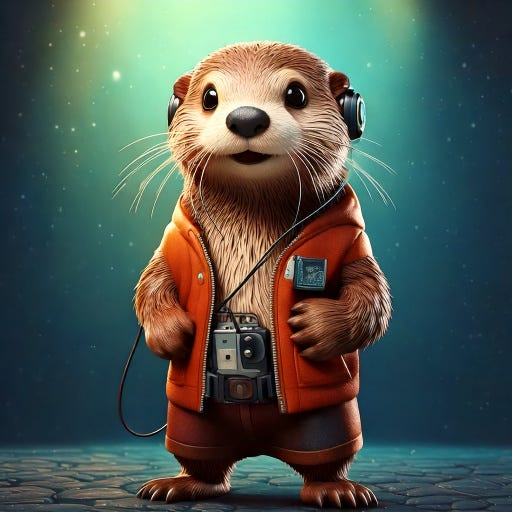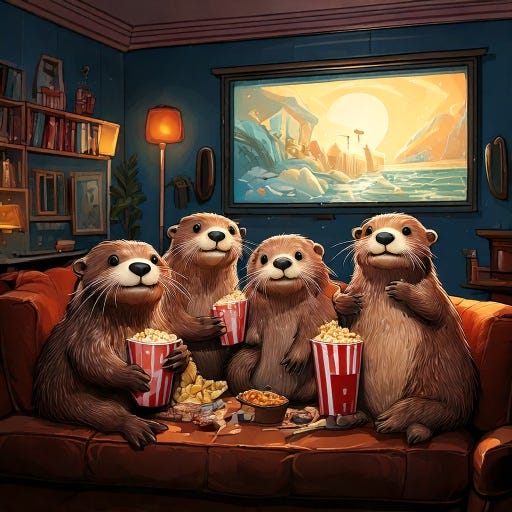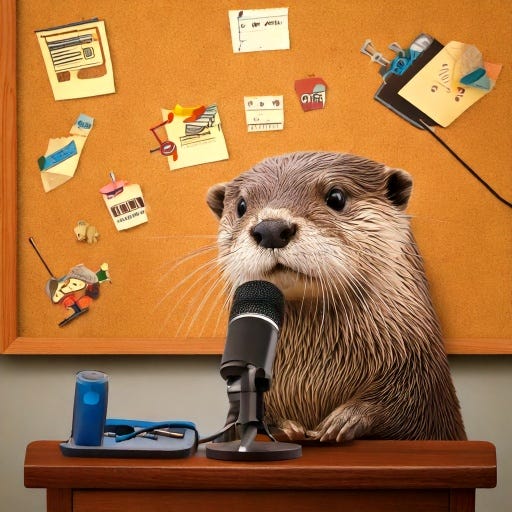Rise and Shine Otters, it’s June 24th, and if you woke up today wondering if the universe left you a note—well, it did. It’s tucked in your coffee steam, sung by the finches, and stitched into the blue of the sky. A little cosmic Post-it that says, "Today’s the day to give old things new meaning, eat something sweet, and maybe read a ghost story."
To start off—it’s National Upcycling Day. A day that asks, "What if broken isn’t useless?" What if the dented chair, the frayed flannel, the worn-out heart—what if they’re not ready for the landfill just yet? Maybe they just need a second life. A little love. A little imagination. After all, isn’t that what we’re all doing here in spectacular studios next to the swamp? Turning the scraps of modern civilization into something meaningful. Into community.
And if that wasn't enough to make your inner tinkerer smile, it’s also National Patch Day. Not patches of code or nicotine or software updates—but honest-to-goodness fabric patches. The kind grandma stitched onto Grandpa’s elbow. The kind that says, “I’m not throwing this away. I’m fixing it.” A badge of honor in a disposable world. Fashion meets philosophy. Resilience in thread.
And for those looking for a deep cut on Patch Day, he really was never the same after the knife fight with Bo… ah the days of our lives.
Now, let’s not forget it’s also National Pralines Day—a holiday sure to please the sweet tooth of anyone who’s walked past a street vendor in the French Quarter or snuck a handful from a candy dish at grandma’s. Pecans, sugar, butter... That’s not just candy. That’s comfort dressed as indulgence. It’s a Southern lullaby in edible form.
The sky cracked purple and the rain started to fall, symbolically, anyway. That was the day Prince's “Purple Rain” debuted in theaters. Not just a movie. A revelation. A guitar-wielding storm of velvet, heartbreak, and defiant glamour. Prince didn’t just blur lines—he danced across them in high-heeled boots, shredding solos like they were thunderbolts hurled from the gods. Purple Rain taught us that pain can be poetic, and love, when put to music, can feel like resurrection.
Flash forward a year to 1985, and the world witnessed another kind of resurrection—Coca-Cola brought back “Classic Coke” after the infamous New Coke flop. Turns out you can mess with perfection, but not for long. America revolted like Grandma’s recipe had been rewritten by a focus group. So Coca-Cola did the corporate walk of shame, reintroducing “Coca-Cola Classic” like a lover crawling back with flowers and fizzy apologies. And wouldn’t you know it—it worked. Sales spiked. Hearts melted. The people won. Democracy in a can.
But maybe the most quietly revolutionary thing that happened on a June 24 came back in 1975, when a small company with big ideas—Microsoft—was officially registered as a business. Just a couple of scrappy programmers from the Northwest—Bill Gates and Paul Allen—tinkering in the basement of the digital age. And whether you see them as liberators or overlords, there’s no denying they helped pull us all into the future. The keyboard became a compass, the screen a window, and we haven’t looked back since.
And speaking of flavor and flair, a few birthdays to brighten our sky today:
Mindy Kaling turns another page in her script today. A woman who’s been breaking molds since “The Office” handed her a pen. Comedian, writer, producer, and proof that being the smartest, sassiest person in the room isn’t just allowed—it’s encouraged. Mindy’s voice, somewhere between biting sarcasm and heartfelt sincerity, is a soundtrack for a generation of women who learned they could be both the joke and the punchline—and still write the next episode.
And from the cutting room to the cutting strings—we raise a toast to Jeff Beck, born this day back in 1944. The guitar wizard who never quite fit into the box marked “rock star.” Too experimental for the mainstream, too soulful to be ignored. Jeff Beck played the guitar like it was telling secrets no one else could hear—whispers from the muse with a wah pedal attached.
Then there’s Mick Fleetwood, keeper of time and wild, witchy rhythms. The man behind the drum kit that drove Fleetwood Mac’s emotional rollercoaster straight through our speakers and into our lives. Fleetwood’s drumming wasn’t just about beat—it was about heartache, redemption, and a little voodoo dust.
But perhaps no one better understood life’s shadows than Ambrose Bierce, who was born on this day in 1842. Journalist, satirist, soldier, and ghost hunter of words. His Devil’s Dictionary might be the world’s most cynical mirror—reflecting our follies with a wink and a growl. He wrote of war with a soldier’s ache, and of politics with a poet’s bite. And then, like some dusty American myth, he vanished into Mexico, leaving behind rumors, legends, and a trail of dark laughter.
And in 1947, pilot Kenneth Arnold reported seeing nine "flying saucers" near Mount Rainier—marking what many believe to be the beginning of the modern UFO era. Proof that even the sky likes to keep secrets.
So here we are, my beautiful otters. June 24th.
A day for turning the old into the extraordinary. A day for spinning sugar and nuts into something worth savoring. A day to stitch what’s torn, to riff on what’s traditional, and to maybe channel your inner Bierce and write a definition or two of your own.
Maybe today you pick up that broken chair and turn it into art. Maybe you cue up “When Doves Cry” and finally admit what your heart’s been hoarding. Or maybe, just maybe, you pour yourself a cold Classic Coke, sit on the porch, and let the past catch up with you. But if you want to do it right, grab a Mexican Coke, it’s made with cane sugar which is the original Classic Coke, not the new corn sugar which is New Classic Coke.
This is Spiess in the Morning—broadcasting and podcasting straight into your soul, with a little static, a little sweetness, and maybe just a little purple left in the clouds.
This is Spiess in the Morning, reminding myself and anyone listening that time is just a sundial turning, and we’re all just standing in its light.
You know, I was out yesterday, barefoot in the grass, sleeves rolled up, soaking in a little June sun—because in Minnesota, when the sun makes an appearance, we treat it like royalty. We follow it around like cats in a warm patch on the floor. But like all royalty, too much exposure can burn you.
Sunlight. It's the original power source. Long before we figured out how to burn oil or split atoms, the sun was already baking bread, growing crops, and kissing cheeks red with life. Our bodies crave it. Not just the warmth, not just the brightness—but the biology of it. Vitamin D. That elusive little hormone our skin manufactures when UVB rays tap it just right. It's a light-induced alchemy—turning cholesterol into vitality. Without it? Well… you get rickets. That old Dickensian disease that makes your bones soft and your posture hunched, like life’s too heavy to carry.
But here's the rub—like any relationship, our love affair with the sun is complicated. You need it, but too much of it, and your skin starts sending up flares. UV rays don’t just tan you—they mutate you. DNA damage, premature wrinkles, and the big C, melanoma. We slather on the SPF 50 and hope for the best. But even there… we’re not in the clear.
Some of those chemical sunscreens we smear on are endocrine disruptors, slipping under our skin and into our bloodstreams, whispering strange messages to our hormones. Oxybenzone, octinoxate—sounds more like sci-fi villains than skin savers. And these potions, they don’t just stay on us—they wash off in lakes, drift into cattails, disrupting life in places far removed from our beach towels and sun decks.
I think about the farmers—sunrise to sunset, sleeves and wide-brimmed hats, tan lines like maps of labor. The old-timers didn’t have SPF. They had shadows and good sense. They worked with the sun, not against it. Rested in the high heat. Rose early, wound down at dusk. That’s not just good farming—that's circadian rhythm. Nature's clock embedded deep in your DNA.
But somewhere along the line, we stopped listening. We invented the sunroom—glass boxes where we trap sunlight like it’s a museum exhibit. We want it, but we want it tamed. Controlled. Our skin behind windows, our lives inside schedules. Midnight workouts. Fluorescent offices. Blue light insomnia. It’s no wonder our bodies rebel.
Maybe the answer isn’t just sunscreen, or supplements, or another app to tell you when to walk outside. Maybe it’s more… primal. Like waking up with the sun, getting your light when the world says it's time, and dimming down when the darkness creeps in. Letting your biology breathe in sync with the solar metronome.
So today, maybe crack a window. Let that sunbeam crawl across your desk. Go outside in the morning when the rays are gentle and the earth is still stretching its legs. Cover up, but not so much you forget the sensation of being solar-powered.
Because in the grand dance of planets and photons, we’re not spectators. We’re participants.
And the sun? It’s not just up there in the sky—it’s in every cell that sings.
This is Spiess in the Morning, reminding myself and anyone listening to turn toward the light… but bring a hat.
Spiess in the Morning, your cosmic custodian of the airwaves and soothsayer of the swamp.
Now, let’s be kind and rewind the tape — back to 1979. Japan. A pocket-sized revolution hits the streets. A sleek little box with orange foam headphones, weighing less than a paperback, changing the way we connect with music — and the world — forever.
The Sony Walkman.
It didn’t beep. It didn’t ring. It didn’t scroll, swipe, or ding. It clicked. And whirred. And if you were lucky, it hissed a little as your cassette did its thing. Suddenly, music wasn’t just something you played in your room or in your car. It became a soundtrack for your life. Portable. Personal. Private.
It’s hard to remember now — when everyone’s got earbuds and Bluetooth implants practically welded to their skulls — just how radical that idea was. Before the Walkman, music was communal. It was boom boxes on stoops, car stereos cranked on summer nights, jukeboxes in diners. But the Walkman made it intimate. Internal. It was a love letter whispered right into your ears.
And with it came change.
Joggers now had rhythm in their stride. The 5 a.m. runner in Maplewood State Park was suddenly Rocky Balboa with a Gloria Gaynor hook in his soul. Personal fitness got a beat, and gyms turned into discotheques for the determined.
But — like most seismic shifts — the Walkman’s ripple effect wasn’t all roses and remastered Fleetwood Mac.
You see, there’s something ancient about walking through a forest and hearing… the forest. The crunch of leaves underfoot. The rustle of a deer in the brush. The murmured language of wind through pine. The Walkman gave us the power to override that — to edit nature, curate experience, drown it out with ELO or ironically enough - a little Earth, Wind & Fire.
We started tuning in and dropping out — not of society, like the hippies before us — but of presence. Conversation suffered. Eye contact faded. Kids slipped on their headphones and slipped out of the room. You could be surrounded by people, but completely alone — a cocoon of synth and snare.
And then there’s the hearing thing. Oh yeah. That glorious volume dial — turned up just a notch too far. Repeatedly. Daily. Ears weren’t designed for concerts at point-blank range. But we did it. And now a generation walks around with tinnitus like it’s the ghost of concerts past.
And our attention spans? Well, we got used to skipping. Fast-forwarding. Editing our experience on the fly. We built playlists. We curated our vibe. We said no to Side B if Side A didn’t slap. And in doing so, we trained our brains to crave the highlight reel — not the slow burn. Not the patience of a full album, a full thought, or a full moment.
Now don’t get me wrong — I loved my Walkman. Still do. That clunky blue rectangle was my passport through breakups, breakdowns, and big ideas. It got me through my Crichton-on-the-road phase and my Peckskamp-needs-more-harmonica phase. But like all tools, it came with tradeoffs. It gave us solitude and stole our silence. It gave us movement and muted the world.
So today, if you’re out walking under this bright northern sky, maybe pop those headphones off for a minute. Hear the wind. The redwing blackbirds. Maybe even your own breath. Give yourself back the sound of life — unfiltered, uncompressed, unskipped.
And if you’re feeling brave… go analog. Dust off that Walkman, pop in a tape, and see how Side B feels when you don’t skip a single track.
This is Spiess in the Morning, reminding myself and anyone else listening that sometimes the best soundtrack… is just being present.
Spiess in the Morning here, broadcasting and podcasting through the morning mist and into your coffee cup. Today, we're cracking open a cold one—not a beer, not a root beer—but a cultural artifact. A carbonated case study in identity, memory, and maybe, just maybe… manipulation.
I'm talking about New Coke and its bubbly return as Coca-Cola Classic.
Now, for those of you too young to remember or too wise to get suckered in—let me take you back to 1985. Ronald Reagan was in the White House, shoulder pads ruled fashion, and capitalism was being rebranded as cool. MTV was feeding our eyeballs, and Wall Street was whispering through Michael Douglas that greed was good.
Then came the fizz heard round the world. Coca-Cola, that syrupy symbol of American tradition, decided to mess with the formula. After 99 years of sugared sovereignty, the company dropped the original recipe and introduced a new, "improved" flavor: New Coke.
The result? The people lost their ever-loving minds.
Now, on the surface, this looked like a business decision. Taste tests showed folks preferred the sweeter New Coke to the original—and hey, Pepsi had been nipping at Coke's heels with a marketing blitz that made soda feel like a revolution.
But this wasn’t just about sugar levels or fizz ratios. No, sir. This was psychological warfare. Coke wasn’t just a beverage. It was Mom, baseball, Route 66. It was Americana in a red and white can. When they changed the formula, it wasn’t just your drink that changed—it was you. It was a betrayal, a liquid identity crisis.
People stockpiled the old bottles. They wrote letters—40,000 of them. They organized protests. One man in Seattle hoarded enough Coke to last the rest of his life. Another tried to sue. For real. As if altering the flavor of your soda was tantamount to treason.
But here's the rub, dear listeners: What if the switch was the plan all along?
Now, I’m not saying it was a conspiracy. But I’m not not saying that either. The theory goes that Coke execs, possibly hopped up on Wall Street wizardry and a little too much Studio 54 nostalgia, knew New Coke would flop. That they’d yank the rug out just long enough for people to scream for their old friend back. And when they returned it—Coke Classic—it wouldn't just be a drink. It’d be a resurrection.
Sales soared. Coke beat Pepsi. America rejoiced. It was like the Second Coming, but with high fructose corn syrup.
Symbolically? Oh, man. This whole soda saga is a decoder ring for the '80s. We learned that people don’t want better—they want familiar. We don’t want innovation in our sacred icons. We want them to taste like we remember. Like family, or summer, or that first kiss in the back of a rusted-out pickup.
And what does that say about us?
Maybe that in times of chaos—globalization, cable TV, Chernobyl—we crave the constancy of a red can and white script. A reminder that some things shouldn’t change. Or maybe we just really, really hate surprises in our soft drinks.
So next time you crack open a can of Coke Classic, take a moment. Sip slowly. You're not just tasting caramel and bubbles—you’re tasting memory, marketing genius, and the psychology of a nation clinging to its past through a straw.
This is Spiess in the Morning, reminding myself and anyone listening, that sometimes, to find out who we are, we just need to lose our fizz… and fight to get it back. Then lose it again. Then go down to Mexico and get it back once again.
Otter and out.
The OtterTalk media network – Doing our best to keep the small town smiles alive, fish tales told and the coffee percolating.
CLICK HERE FOR SPECIAL PARAMOUNT PLUS PARTNERSHIP PAGE
OTTER TALK COMMUNITY CALENDAR
Kate’s Korner Antiques & Collectables is NOW OPEN in Elizabeth! Located across the street from the liquor store on Hwy 59, Kate’s Korner is a must stop and see. If you see the flags flapping in the wind, she’s open and ready to serve your nostalgic needs.
Paul’s Farm Fresh Eggs - $3/dozen - call or text 218-205-7779 (The Greater Elizabeth Area)
Abbie’s Farm Fresh Eggs - $9 for 30 eggs - washed or unwashed - call or text 320-349-0942 (The Greater Morris Area)
IBC Totes for sale - Endless uses for these totes from firewood storage to rainwater catcher to stacking two for an outdoor shower. Pick up encouraged, delivery available. Food grade are $100 each and non-food grade are $65 each. Call 218-639-1116
The Shoreline Bowling Alley in Battle Lake has open bowling All Summer Long. Call 218-864-5265 for more info or stop by 505 N Lake Ave, Battle Lake, MN.
The Bookmobile has books, movies & magazines to check out, but the Bookmobile and member libraries also offer a wide variety of electronic resources including Ebooks, downloadable audiobooks, streaming movies, TV and music, and a wide variety of educational databases and distance learning resources.
The Bookmobile stops across from the Parkers Prairie Post Office every other Wednesday throughout the year. You can find the Bookmobile there from 3 pm to 4 pm.
The Bookmobile stops in Elizabeth, only this stop isn’t at the community center or the public park, rather it’s a private house. Next stop is July 3 in Elizabeth and it’s a block north of the C-Store on the gravel road, or 206 N Pelican Street, for you GPS folk.
Check out more Bookmobile towns by clicking here
If you have a community event for the Community Bulletin Board, email studio@ottertalk.media
Want Otter Talk to highlight a local musician or upcoming gig? Email studio@ottertalk.media
Happy Tuesday Everyone! Feel free to like, share and or comment!
Please tune in tomorrow for more local lakes area tunes, totally tubular tales, and some small-town smiles.
Know someone who might enjoy today’s program? Give a gift subscription or share it on!
Have some news? How about an idea for the show? Email studio@ottertalk.media





















Share this post